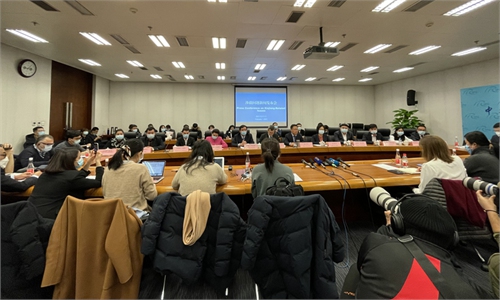Individuals rumored to be 'missing' in Xinjiang come forward to refute lies of anti-China forces
Video: GT
Residents from Northwest China's Xinjiang Uygur Autonomous Region who have been listed as "missing" by an overseas "database" appeared in a video on Monday and refuted lies that they had been "persecuted." The so-called database for missing persons in Xinjiang has been exposed as a tool used by separatists from Xinjiang to defame the region.
The third press conference on Xinjiang-related issues was held in Beijing on Monday, with officials, residents, religious figures and graduated trainees from the former vocational education and training centers in the region answering questions from a dozen foreign and domestic media representatives.
Recently, some Western media cited "evidence" from the "Uyghur Transitional Justice Database" and claimed that some overseas individuals discovered that their relatives in the region are "missing" or "being persecuted." Some even posted photos and videos of these "missing" family members.

Children visit the ancient city of Kashgar in northwest China's Xinjiang Uygur Autonomous Region, May 24, 2020. (Xinhua/Gao Han)
However, Elijan Anayat, a spokesperson of the Information Office of the Xinjiang regional government, said the so-called database is "full of disinformation."
"The 'database' is a tool for anti-China forces and 'East Turkistan' separatists in the US and the West to defame Xinjiang. As I understand, it is funded by the US National Endowment of Democracy. The separatist organization World Uyghur Congress (WUC) is responsible for coercing and fooling overseas individuals from Xinjiang to spread information of their family members being missing," Elijan said.
The spokesperson said that they have verified the information on the "missing" persons released by the database and found that most people's situations are the opposite to what the database described.
Gulnar Uful, a resident of Kashi prefecture, who was rumored to be "detained" in Xinjiang by the database, attended the Monday press conference in Beijing.
"I saw my name appear in many lists made by anti-China forces many times, in which they claimed that I have been detained or even rumored to be 'tortured' to death. The disinformation has brought psychological damage to me and my family and disturbed my life and work," Gulnar said.
Gulnar said she had refuted the rumors many times on different occasions, but the WUC used this rumor again and put her information on the so-called database.
"For me, this is not database at all, it is a database for lies. I live a good life and want to warn the WUC and the three evil forces [separatism, extremism and terrorism] to stop using my picture to make lies, stop hurting my family and me and my country, otherwise, I will use legal means to protect my interests," she said.
The regional spokesperson also provided other examples, such as Tayir Esai, a doctor from the People's Hospital in Kucha of Aksu, retired teacher Ayisham Sadik in Aksu, and Tayir Talifu, a writer and retired editor from Kashi Daily, all of whom are living normal lives in Xinjiang.
Elijan said that there are some people in the database who have been sentenced for committing terrorist activities, murder, rape, selling drugs, robbery and other crimes. For example, Sami Bary from Turpan has been sentenced to life imprisonment for organizing, leading and participating in terrorist organizations and murder. Ekber Yiming from Urumqi has been sentenced to 25 years in prison for organizing and leading mafia-style gangs.
"For these criminals, the anti-China forces in the US and West are making excuses for them and maliciously claiming that they are persecuted in 'camps.' This is totally indulging crimes… we want to ask whether the US would allow murderers, rapists or robbers to escape the law?" Elijan asked.
Apart from the reasons given above, some people living overseas may have lost contact with their relatives in Xinjiang due to wrong numbers or change of contact numbers. Some may be coerced or coaxed by the three evil forces to make up lies about "missing family members", Elijan said.
The spokesperson said that people who have lost contact with their relatives in Xinjiang can turn to Chinese embassies for help.


